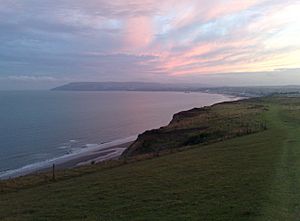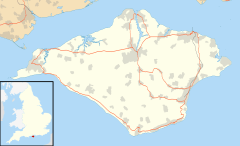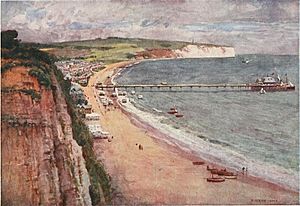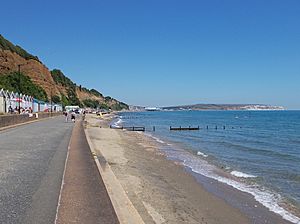Sandown Bay facts for kids
Quick facts for kids Sandown Bay |
|
|---|---|
 Sandown Bay at dusk; looking south-west from Culver Down |
|
| Civil parish | |
| Ceremonial county | |
| Region | |
| Country | England |
| Sovereign state | United Kingdom |
| EU Parliament | South East England |
| UK Parliament |
|
Sandown Bay is a large, open bay on the southeastern coast of the Isle of Wight. It stretches for about 8.5 miles (13.7 km). The bay starts near Culver Down in the northeast. It ends just south of Shanklin, near the village of Luccombe.
The towns of Sandown, Lake, and Shanklin are located along the bay's coast. Luccombe and Upper Ventnor offer amazing views. You can see both Sandown Bay and The Undercliff from these spots. The bay is often calm because it is protected from strong winds. This makes it a good place for boats, even large cargo ships, to stop before continuing their journeys.
Contents
History of Sandown Bay
In the past, Sandown Bay was very important for defense. Its wide beach was a perfect spot for an army to land. To protect against attacks from France or Spain, King Henry VIII built Sandown Castle. This castle was part of his plan to defend England's south coast.
However, the castle was still being built in 1545. During a French invasion of the Isle of Wight, the castle was taken over. Over time, the castle fell apart due to coastal erosion. This is when the land is worn away by the sea. The castle was torn down in 1631. You can still see parts of its foundations at low tide. Later, a new fort called Sandown Fort was built. It was also known as the "Diamond Fort" because of its unique shape.
Sandown Bay in Victorian Times
Sandown and Shanklin became very popular in the Victorian era. This was a time when Queen Victoria ruled Britain (1837-1901). Tourists loved the sandy beaches and good weather. New ways to travel, like railways and paddle steamers, made it easy for people to visit.
These areas changed from quiet places to busy seaside resorts. New things were built, like a long promenade along the seafront. Many large hotels were also built. Sandown Pier opened in 1879. It was originally 360 feet long and later grew to 875 feet. You can still see many buildings from the Victorian era around the bay today.
Geography of Sandown Bay
Sandown Bay has beautiful sandy beaches. They stretch all the way from Shanklin to Culver Down. This is because of something called Longshore drift. This is when waves move sand along the coastline. The bay has over 5 miles (8 km) of unbroken sandy beach. This makes it one of the longest beaches in the British Isles.
The cliffs along the bay are made of soft sandstone. They are between 30 and 130 feet (9 to 40 meters) high. These cliffs have had problems with erosion and instability. In 1988, the Isle of Wight Council started a big project. They worked to make the cliffs safer, especially near tourist areas.
You can get the best view of Sandown Bay from Culver Down to the north. The Isle of Wight Coastal Path follows the entire bay. You can walk along the cliff tops or on the concrete seawall.
The seabed of the bay is a mix of sand, shells, and gravel. The water is shallow for about a quarter of a nautical mile (about 460 meters) from the shore. The total area of the bay is about 5 square miles (13 square kilometers).
Economy and Tourism
The economy of Sandown Bay relies a lot on shops and hotels. This is because many tourists visit the area. About 500,000 visitors come to the bay each year.
In 2016, a plan called the "Bay Area Action Plan" was created. This plan aims to improve public spaces and bring more tourists to the bay. It will guide development for the next 15 years. The area around the bay is home to over 21,000 people.
 | Emma Amos |
 | Edward Mitchell Bannister |
 | Larry D. Alexander |
 | Ernie Barnes |




